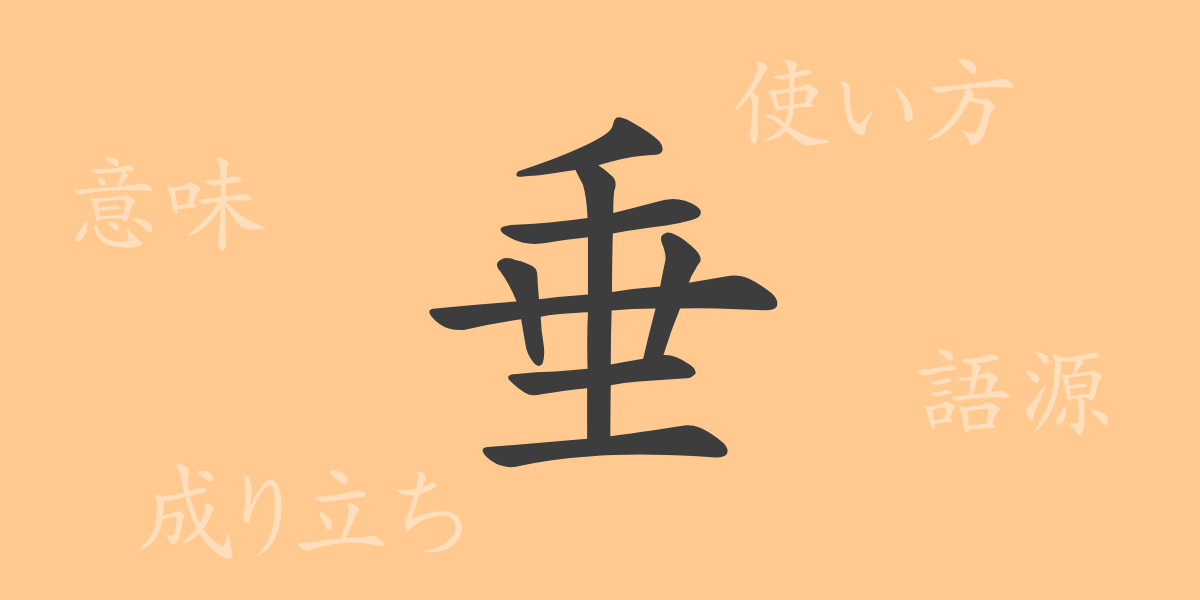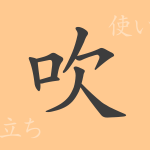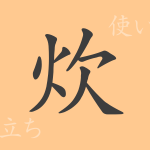The beauty of the Japanese language is reflected in its delicate characters. Among the commonly used kanji, ‘垂’ (た.れる, た.らす, た.れ, -た.れ, た.る) embodies the depth of Japanese culture both in form and meaning. This article delves into the origins, meanings, usages, and the rich phrases and proverbs of ‘垂’, offering a fresh perspective on its historical significance and everyday importance.
Origins of 垂
The kanji ‘垂’ originated from ancient Chinese pictographs, representing the act of ‘water falling vertically’. Initially depicted as a transformed ‘士’ above a vertical line, it symbolized water or rain falling downwards. Over time, ‘垂’ evolved from more concrete depictions in oracle bone and bronze scripts to its current form, continually symbolizing the natural phenomenon of dripping or falling liquid.
Meaning and Usage of 垂
‘垂’ primarily means ‘to hang down’, ‘to drape’, or ‘to let down’. It describes the natural action of objects hanging or being lowered from above. Metaphorically, it is also used to express ‘pouring’ or ‘transmitting’, showcasing its versatility in describing both natural actions and human behaviors. This kanji plays a crucial role across various contexts in the Japanese language, emphasizing both physical and figurative aspects.
Readings, Stroke Count, and Radical of 垂
Here are some fundamental details about the kanji ‘垂’:
- Readings: On’yomi ‘スイ’, Kun’yomi ‘た.れる’, ‘た.らす’, ‘た.れ’, ‘-た.れ’, ‘た.る’
- Stroke Count: 8 strokes
- Radical: Earth radical (つちへん)
Phrases, Idioms, and Proverbs Using 垂
There are many phrases and proverbs incorporating ‘垂’, each reflecting its meaning vividly:
- 垂涎 (すいぜん): Strongly desiring something that belongs to someone else.
- 垂死 (すいし): Being in a dying state, on the verge of death.
- 垂直 (すいちょく): Being perpendicular, straight up and down relative to the ground.
- 手垂れ (てだれ): Hanging hands down doing nothing; also refers to a person doing so.
- 垂れ幕 (たれまく): A vertical banner made of cloth or paper, printed with text or images.
These expressions utilize ‘垂’ to enrich Japanese language, illustrating its extensive use across various scenarios.
Conclusion on 垂
The kanji ‘垂’, with its depiction of falling water or rain, is foundational in expressing natural and figurative concepts in Japanese. Widely used in idioms, proverbs, and everyday conversation, ‘垂’ brings to life the expressions of the language. Each encounter with ‘垂’ is an opportunity to appreciate its historical depth and the intricacies of Japanese linguistic tradition.

























